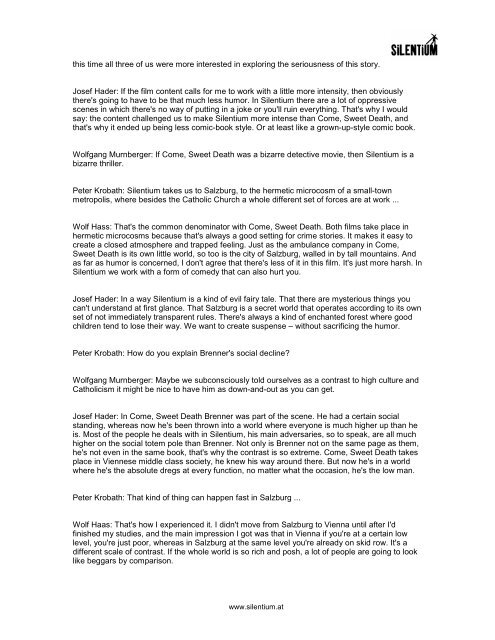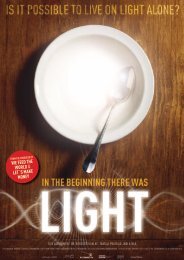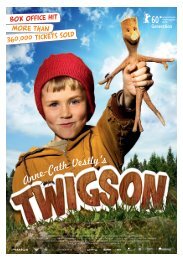Create successful ePaper yourself
Turn your PDF publications into a flip-book with our unique Google optimized e-Paper software.
this time all three of us were more interested in exploring the seriousness of this story.<br />
Josef Hader: If the film content calls for me to work with a little more intensity, then obviously<br />
there's going to have to be that much less humor. In Silentium there are a lot of oppressive<br />
scenes in which there's no way of putting in a joke or you'll ruin everything. That's why I would<br />
say: the content challenged us to make Silentium more intense than Come, Sweet Death, and<br />
that's why it ended up being less comic-book style. Or at least like a grown-up-style comic book.<br />
Wolfgang Murnberger: If Come, Sweet Death was a bizarre detective movie, then Silentium is a<br />
bizarre thriller.<br />
Peter Krobath: Silentium takes us to Salzburg, to the hermetic microcosm of a small-town<br />
metropolis, where besides the Catholic Church a whole different set of forces are at work ...<br />
Wolf Hass: That's the common denominator with Come, Sweet Death. Both films take place in<br />
hermetic microcosms because that's always a good setting for crime stories. It makes it easy to<br />
create a closed atmosphere and trapped feeling. Just as the ambulance company in Come,<br />
Sweet Death is its own little world, so too is the city of Salzburg, walled in by tall mountains. And<br />
as far as humor is concerned, I don't agree that there's less of it in this film. It's just more harsh. In<br />
Silentium we work with a form of comedy that can also hurt you.<br />
Josef Hader: In a way Silentium is a kind of evil fairy tale. That there are mysterious things you<br />
can't understand at first glance. That Salzburg is a secret world that operates according to its own<br />
set of not immediately transparent rules. There's always a kind of enchanted forest where good<br />
children tend to lose their way. We want to create suspense – without sacrificing the humor.<br />
Peter Krobath: How do you explain Brenner's social decline?<br />
Wolfgang Murnberger: Maybe we subconsciously told ourselves as a contrast to high culture and<br />
Catholicism it might be nice to have him as down-and-out as you can get.<br />
Josef Hader: In Come, Sweet Death Brenner was part of the scene. He had a certain social<br />
standing, whereas now he's been thrown into a world where everyone is much higher up than he<br />
is. Most of the people he deals with in Silentium, his main adversaries, so to speak, are all much<br />
higher on the social totem pole than Brenner. Not only is Brenner not on the same page as them,<br />
he's not even in the same book, that's why the contrast is so extreme. Come, Sweet Death takes<br />
place in Viennese middle class society, he knew his way around there. But now he's in a world<br />
where he's the absolute dregs at every function, no matter what the occasion, he's the low man.<br />
Peter Krobath: That kind of thing can happen fast in Salzburg ...<br />
Wolf Haas: That's how I experienced it. I didn't move from Salzburg to Vienna until after I'd<br />
finished my studies, and the main impression I got was that in Vienna if you're at a certain low<br />
level, you're just poor, whereas in Salzburg at the same level you're already on skid row. It's a<br />
different scale of contrast. If the whole world is so rich and posh, a lot of people are going to look<br />
like beggars by comparison.<br />
www.silentium.at





